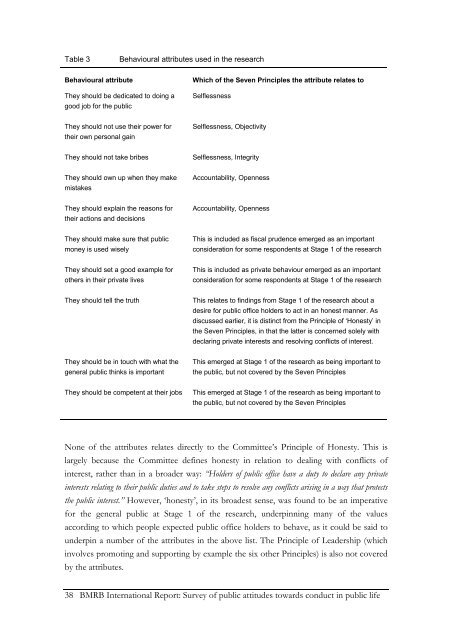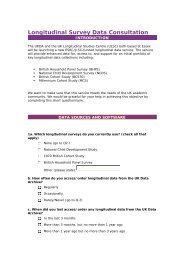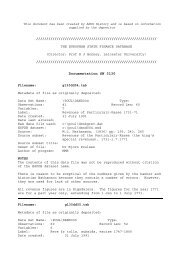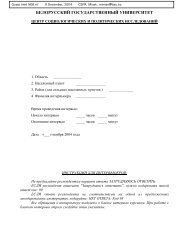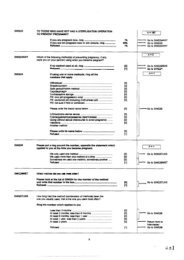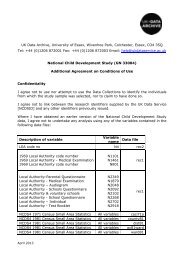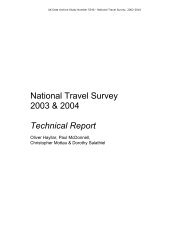The Seven Principles of Public Life - ESDS
The Seven Principles of Public Life - ESDS
The Seven Principles of Public Life - ESDS
Create successful ePaper yourself
Turn your PDF publications into a flip-book with our unique Google optimized e-Paper software.
Table 3 Behavioural attributes used in the research<br />
Behavioural attribute<br />
<strong>The</strong>y should be dedicated to doing a<br />
good job for the public<br />
<strong>The</strong>y should not use their power for<br />
their own personal gain<br />
<strong>The</strong>y should not take bribes<br />
<strong>The</strong>y should own up when they make<br />
mistakes<br />
<strong>The</strong>y should explain the reasons for<br />
their actions and decisions<br />
<strong>The</strong>y should make sure that public<br />
money is used wisely<br />
<strong>The</strong>y should set a good example for<br />
others in their private lives<br />
Which <strong>of</strong> the <strong>Seven</strong> <strong>Principles</strong> the attribute relates to<br />
Selflessness<br />
Selflessness, Objectivity<br />
Selflessness, Integrity<br />
Accountability, Openness<br />
Accountability, Openness<br />
This is included as fiscal prudence emerged as an important<br />
consideration for some respondents at Stage 1 <strong>of</strong> the research<br />
This is included as private behaviour emerged as an important<br />
consideration for some respondents at Stage 1 <strong>of</strong> the research<br />
<strong>The</strong>y should tell the truth This relates to findings from Stage 1 <strong>of</strong> the research about a<br />
<strong>The</strong>y should be in touch with what the<br />
general public thinks is important<br />
desire for public <strong>of</strong>fice holders to act in an honest manner. As<br />
discussed earlier, it is distinct from the Principle <strong>of</strong> ‘Honesty’ in<br />
the <strong>Seven</strong> <strong>Principles</strong>, in that the latter is concerned solely with<br />
declaring private interests and resolving conflicts <strong>of</strong> interest.<br />
This emerged at Stage 1 <strong>of</strong> the research as being important to<br />
the public, but not covered by the <strong>Seven</strong> <strong>Principles</strong><br />
<strong>The</strong>y should be competent at their jobs This emerged at Stage 1 <strong>of</strong> the research as being important to<br />
the public, but not covered by the <strong>Seven</strong> <strong>Principles</strong><br />
None <strong>of</strong> the attributes relates directly to the Committee’s Principle <strong>of</strong> Honesty. This is<br />
largely because the Committee defines honesty in relation to dealing with conflicts <strong>of</strong><br />
interest, rather than in a broader way: “Holders <strong>of</strong> public <strong>of</strong>fice have a duty to declare any private<br />
interests relating to their public duties and to take steps to resolve any conflicts arising in a way that protects<br />
the public interest.” However, ‘honesty’, in its broadest sense, was found to be an imperative<br />
for the general public at Stage 1 <strong>of</strong> the research, underpinning many <strong>of</strong> the values<br />
according to which people expected public <strong>of</strong>fice holders to behave, as it could be said to<br />
underpin a number <strong>of</strong> the attributes in the above list. <strong>The</strong> Principle <strong>of</strong> Leadership (which<br />
involves promoting and supporting by example the six other <strong>Principles</strong>) is also not covered<br />
by the attributes.<br />
38 BMRB International Report: Survey <strong>of</strong> public attitudes towards conduct in public life


